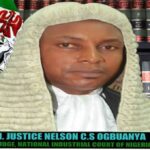The news is rife with Asiwaju Bola Ahmed Tinubu’s encounter with the United States authorities in the 90s over allegations of narcotics trafficking and money laundering. This was aggravated by the recent release of certified true copies of court processes relating to the case.
In view of this, my former boss and the official spokesperson for All Progressives Congress (APC) 2023 Presidential Campaign Council, Mr. Festus Keyamo SAN, moved to defend his boss, the APC’s Presidential Candidate, Tinubu. Keyamo is also the current Minister of State for Labour and Employment in Nigeria.
Keyamo spoke with Seun Okinbaloye, Channels Television’s Political Correspondent, where he made some misleading statements pertaining to the matter.
Tinubu was not treasurer of a narcotics group as being speculated, says Tinubu/APC Presidential Campaign Council spokesman Festus Keyamo.#CTVTweets#PoliticsToday pic.twitter.com/yufWLjNTRA
— Channels Television (@channelstv) November 9, 2022
1. Is source of funds being from narcotics a mere speculation?
Seun asked Keyamo to answer the fundamental question relating to the source of money Tinubu deposited in his accounts. In his answer, Keyamo said that the allegation that the source of funds being from narcotics trafficking was mere speculation. He relied solely on the Affidavit of Kevin Moss sworn to on 20 July 1993 where the deponent stated in paragraph 2 that there is probable cause to believe that certain bank accounts controlled by Bola Tinubu were involved in financial transactions in violation of US law on money laundering and represents proceeds of drug trafficking. It was the use of probable cause that Keyamo latched on.
Keyamo clearly ignored the findings of the US Court which confirmed the allegation as fact based on compelling undisputed evidence before the Court. By Decree of Forfeiture as to Funds held by First Heritage Bank made on October 4, 1993, John A. Nordberg, US District Judge affirmatively ordered that:
The funds in the amount of $460,000 in account 263226700 held by First Heritage Bank in the name of Bola Tinubu represent proceeds of narcotics trafficking or were involved in financial transactions in violation of 18 U.S.C. §§ 1956 and 1957 and therefore these funds are forfeited to the United Stated pursuant to 21 U.S.C. § 881(a)(6) and 18 U.S.C. § 981…
Note that 18 U.S. Code § 1956 touches on money laundering; and 18 U.S. Code § 1957 provides for engagement in monetary transactions in property derived from specified unlawful activity.
2. Was it all about Tinubu using the address of some suspects?
Keyamo stated that the case was all about Tinubu using the address of some principal suspects to open bank accounts in the US. According to him, the whole gamut of the Affidavit of Kevin Moss and the entire investigation had nothing to do with Asiwaju but with some principal suspects, one of whom was already arrested.
However, the 49-paragraph Affidavit of Kevin Moss showed that the matter was much more than Tinubu using the address of criminal suspects to open accounts. The address (7504 South Stewart, Chicago, Illinois) wasn’t the main issue. The major problems were:
- As early as 1988, Adegboyega Mueez Akande, with others, operated an organization which distributed narcotics. This distribution operation was conducted on a large scale and the proceeds of the operation were substantial. Tinubu’s funds in his accounts then represented proceeds of the operation or property involved in money laundering. Paragraph 4, Verified Complaint for Forfeiture.
- The investigation disclosed the identity of other individuals, including relatives, who had worked for Akande with various duties in the distribution organization. One of these individuals was identified by the investigation as Bola Tinubu. Tinubu claimed Akande was his cousin and he was found to have deposited funds in Akande’s account. Paragraphs 21, 27 and 31 of the Affidavit.
- Tinubu worked with Mobil Oil Nigeria Ltd. His take home pay was $2,400 per month and Tinubu stated that he had no other sources of income. But then, Tinubu deposited whopping $661,000 and $1,216,500 into his accounts – Paragraph 34 of the Affidavit. This was unimaginable for someone earning $2,400 per month without any other source of income.
- Mobil had confirmed that Tinubu’s position as treasurer at Mobil never involved the transfer of large amounts of money and that Tinubu was never permitted to retain money belonging to Mobil in his personal accounts. – Paragraph 37 of the Affidavit.
- Tinubu lied. According to Agent Moss, on January 30-31, 1992, Tinubu advised agents investigating the matter that he had no business association or financial relationship with Agbele (one of the suspects) or Akande. The information was found to have contradicted his prior statements on January 13, 1992, when he advised law enforcement officers that the money used to open the account at First Heritage Bank had come from Akande. Paragraph 47 of the Affidavit.
The above were some of the major reasons Tinubu’s accounts came under close scrutiny and not merely because he had used the address of crime suspects who happen to be his relatives or tribesmen as Keyamo argued.
3. Was the crux of the whole matter about tax?
Keyamo also stated the case is wholly related to tax. But from the points highlighted above, it was abundantly clear that tax was far from it. Of course, in paragraph 38 of the Affidavit of Agent Moss, it was said that Tinubu failed to file income tax returns since 1984 despite the receipt of interest income credited to the accounts in his name.
However, the Decree of the US Court quoted above clearly declared that Tinubu’s funds in question was being forfeited for being from proceeds of drug trafficking or money laundering and not tax related.
4. Is Forfeiture completely a civil process?
In his further attempt to play down the matter, Keyamo claimed that the Forfeiture Order made by the US Court was purely a civil process. This is not precisely true. The forfeiture in question emanated from criminal investigation. Under US criminal law and procedure, we have civil forfeiture and criminal forfeiture. While the former is not based on criminal conviction, the latter is based on conviction. But both may flow from a criminal matter.
In her article, “Forfeiture Laws and Procedures in the United States of America”, Jean B. Weld (former Senior Trial Attorney, International Unit, Asset Forfeiture and Money Laundering Section, Criminal Division, U.S. Department of Justice) explained the nature of civil forfeiture under 18 U.S.C. § 981:
In the United States, non-conviction based (“NCB”) forfeiture is known as “civil forfeiture.” This judicial process may be brought at any time prior to or after criminal charges are filed, or even if criminal charges are never filed. It is an action filed in court against a property, not against a person.
The opposite of civil forfeiture is criminal forfeiture which is based on conviction and sentencing under 18 U.S.C. § 982.
Tinubu’s case involved civil forfeiture because Tinubu was neither charged nor convicted. But his funds, subject of the forfeiture, were held to be from proceeds of crime – drug trafficking and money laundering.
Tinubu’s accounts housing the illicit funds were the defendants in the proceedings. This is in the form of what is known as an action in rem as shown in the case – Verified Complaint for Forfeiture filed on July 26, 1993 before the United States District Court, Northern District of Illinois, Eastern Division, Case No. 93 C 4483.
Why Tinubu cannot proceed against the US
Many have challenged Tinubu to proceed against the US if he were innocent.
The proceedings leading to the forfeiture of Tinubu’s funds by the US involved a settlement agreement which Tinubu and his other relatives entered into with the US. Undoubtedly, Tinubu and his crew could not assert any legitimate rights to all the funds. They are forever foreclosed from proceeding against the US. In paragraph 6 of the Settlement Agreement titled “Stipulation and Compromise Settlement of Claims to the Funds held by Heritage Bank and Citibank”, it was agreed:
The Claimants, Bola A. Tinubu, K. O. Tinubu (individually and on behalf of the Tinubu Family) and Alhaja Mogati, hereby release and forever discharge the United States, its officers, agents, servants, and employees, its heirs, successors, or assigns from any and all actions, causes of action, suits, proceedings, debts, dues, contracts, judgments, damages, claims, and/or demands whatsoever in law or equity which the Claimants, their heirs, successors, or assigns ever had, now have or may have in the future in connection with the investigation, seizure, detention, forfeiture, disposition and release of the defendant property.
The US Court decided that the $460,000 held in First Heritage Bank in the name of Bola Tinubu shall be forfeited to the US. This decision was based on the Settlement Agreement. It further directed that all other funds in excess and those held in Citibank shall be released. See Settlement Order of Claims to Funds held by Heritage Bank and Citibank of September 15, 1993.














